-
 bitcoin
bitcoin $87959.907984 USD
1.34% -
 ethereum
ethereum $2920.497338 USD
3.04% -
 tether
tether $0.999775 USD
0.00% -
 xrp
xrp $2.237324 USD
8.12% -
 bnb
bnb $860.243768 USD
0.90% -
 solana
solana $138.089498 USD
5.43% -
 usd-coin
usd-coin $0.999807 USD
0.01% -
 tron
tron $0.272801 USD
-1.53% -
 dogecoin
dogecoin $0.150904 USD
2.96% -
 cardano
cardano $0.421635 USD
1.97% -
 hyperliquid
hyperliquid $32.152445 USD
2.23% -
 bitcoin-cash
bitcoin-cash $533.301069 USD
-1.94% -
 chainlink
chainlink $12.953417 USD
2.68% -
 unus-sed-leo
unus-sed-leo $9.535951 USD
0.73% -
 zcash
zcash $521.483386 USD
-2.87%
Is contract mining safe? Key points of smart auditing and vulnerability prevention
Contract mining lets users invest in blockchain mining via smart contracts, offering convenience but carrying risks like vulnerabilities and attacks if not properly audited.
Jun 19, 2025 at 08:08 pm
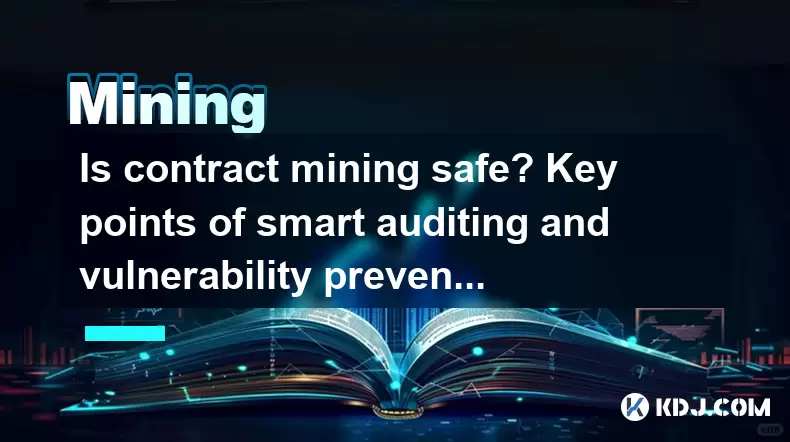
Understanding Contract Mining in the Cryptocurrency Space
Contract mining refers to a method within blockchain ecosystems where users can participate in mining operations through smart contracts. Unlike traditional mining, which requires physical hardware and technical expertise, contract mining allows participants to invest funds into a mining pool or platform governed by programmable agreements on the blockchain.
This system offers convenience and accessibility but also introduces risks, especially when smart contract vulnerabilities are not properly audited. As such, it's crucial for investors and developers alike to understand how contract mining operates and what safeguards should be in place before engaging in such activities.
Smart contracts are self-executing agreements with the terms directly written into code. Any flaw in this code can lead to significant financial losses or exploitation by malicious actors.
Risks Associated with Smart Contracts in Mining Contracts
One of the primary concerns surrounding contract mining is the security of the underlying smart contracts. These contracts often handle large sums of cryptocurrency and must be thoroughly tested and reviewed before deployment.
Common vulnerabilities include:
- Reentrancy attacks, where an external contract repeatedly calls a function before the initial execution completes
- Integer overflow and underflow, leading to unexpected behavior in token transfers or balance calculations
- Improper access control, allowing unauthorized parties to manipulate contract functions
These issues underscore the importance of rigorous auditing processes and continuous monitoring after deployment.
The Role of Smart Auditing in Ensuring Safety
To determine whether contract mining is safe, one must consider the quality of the smart auditing process. Auditing involves reviewing the contract’s source code to detect potential flaws, inefficiencies, and exploitable patterns that could compromise user assets.
A comprehensive audit typically includes:
- Manual code review by experienced blockchain developers
- Automated vulnerability scanning tools
- Formal verification methods to mathematically prove certain properties about the contract
During the audit, particular attention should be paid to:
- Function modifiers and access restrictions
- External calls and reentrancy points
- Token transfer logic and ownership controls
The goal is to ensure that no part of the contract can be manipulated to drain funds or disrupt normal functionality.
Implementing Best Practices for Vulnerability Prevention
Beyond auditing, there are several proactive steps that developers can take to prevent vulnerabilities in smart contracts used for mining:
- Use well-established libraries like OpenZeppelin for common functionalities (e.g., ERC-20 tokens)
- Apply the checks-effects-interactions pattern to avoid reentrancy issues
- Implement circuit breaker mechanisms to pause contract operations if suspicious activity is detected
- Conduct unit testing and integration testing across various scenarios
- Monitor deployed contracts using blockchain explorers and alert systems
Each of these practices contributes to a layered defense strategy, reducing the likelihood of successful attacks or accidental errors.
Evaluating Third-party Platforms and Contracts
When considering participation in contract mining, users must evaluate the platforms they interact with. Not all projects are created equal, and many lack transparency or proper security measures.
Important factors to assess include:
- Public availability of smart contract source code
- Presence of third-party audits from reputable firms
- Transparency in fund management and distribution policies
- Community feedback and historical performance
If any of these elements are missing or unclear, the risk associated with participating in that contract increases significantly.
Frequently Asked Questions
Q1: What should I do if I suspect a mining contract has been compromised?You should immediately stop interacting with the contract, notify the development team if possible, and use blockchain explorers to monitor any unusual transactions.
Q2: Can smart contracts be updated after deployment to fix vulnerabilities?Yes, some contracts are designed with upgradeability features, but this introduces its own set of risks and must be handled carefully through proxy contracts and governance mechanisms.
Q3: How can I verify if a contract has been audited?Check the project’s official documentation, GitHub repository, or blockchain explorer. Reputable audits are usually published publicly and linked from the main website.
Q4: Is contract mining suitable for beginners in cryptocurrency?It depends on the individual’s understanding of smart contracts and risk tolerance. Beginners should start with small investments and only engage with well-audited, transparent projects.
Disclaimer:info@kdj.com
The information provided is not trading advice. kdj.com does not assume any responsibility for any investments made based on the information provided in this article. Cryptocurrencies are highly volatile and it is highly recommended that you invest with caution after thorough research!
If you believe that the content used on this website infringes your copyright, please contact us immediately (info@kdj.com) and we will delete it promptly.
- Bitcoin's Rocky Road: Inflation Surges, Rate Cut Hopes Fade, and the Digital Gold Debate Heats Up
- 2026-02-01 09:40:02
- Bitcoin Shows Cheaper Data Signals, Analysts Eyeing Gold Rotation
- 2026-02-01 07:40:02
- Bitcoin's Latest Tumble: Is This the Ultimate 'Buy the Dip' Signal for Crypto?
- 2026-02-01 07:35:01
- Big Apple Crypto Blues: Bitcoin and Ethereum Stumble as $500 Billion Vanishes Amid Macroeconomic Whirlwind
- 2026-02-01 07:35:01
- Michael Wrubel Crowns IPO Genie as the Next Big Presale: A New Era for Early-Stage Investments Hits the Blockchain
- 2026-02-01 07:30:02
- XRP, Ripple, Support Level: Navigating the Urban Jungle of Crypto Volatility
- 2026-02-01 06:35:01
Related knowledge
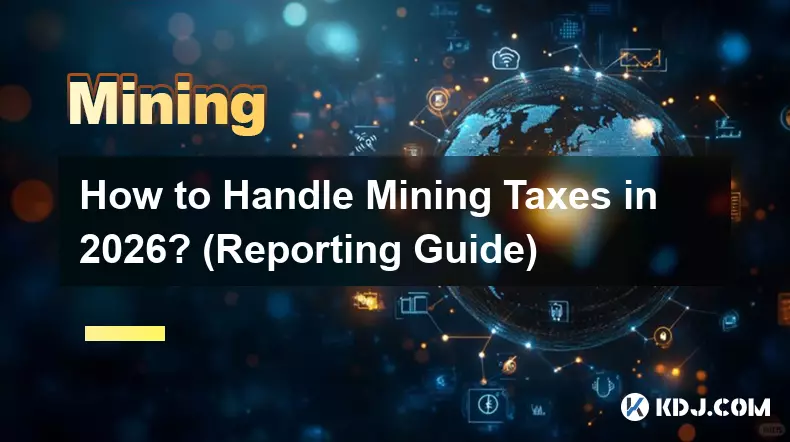
How to Handle Mining Taxes in 2026? (Reporting Guide)
Feb 01,2026 at 01:39am
Tax Classification of Mining Rewards1. Cryptocurrency mining rewards are treated as ordinary income at the fair market value on the date of receipt. 2...
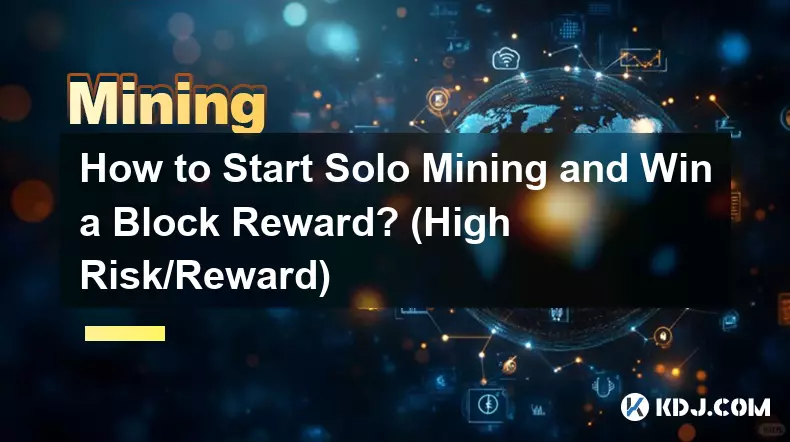
How to Start Solo Mining and Win a Block Reward? (High Risk/Reward)
Feb 01,2026 at 06:40am
Understanding Solo Mining Mechanics1. Solo mining means operating a full node and attempting to solve cryptographic puzzles independently without join...
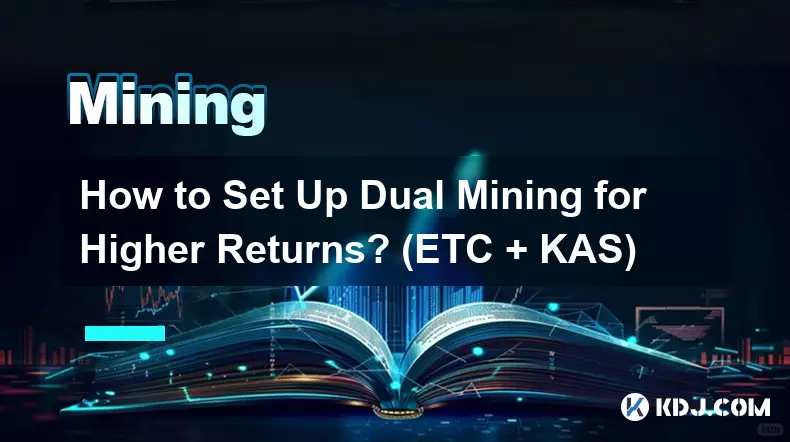
How to Set Up Dual Mining for Higher Returns? (ETC + KAS)
Feb 01,2026 at 02:19am
Dual Mining Fundamentals1. Dual mining allows a single GPU to simultaneously contribute computational power to two different blockchains using compati...
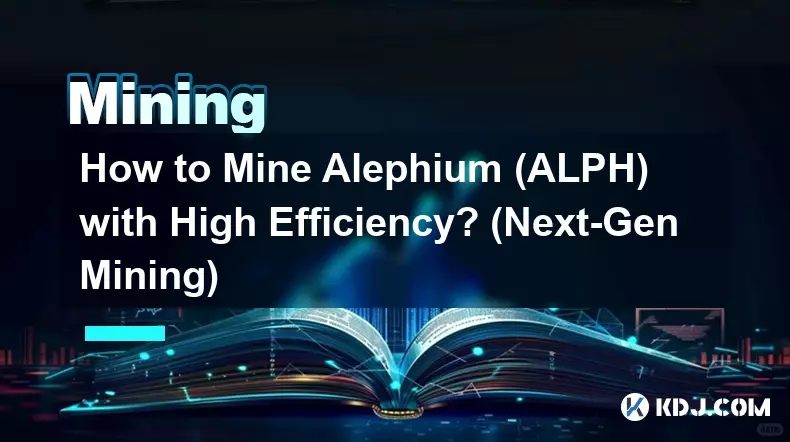
How to Mine Alephium (ALPH) with High Efficiency? (Next-Gen Mining)
Feb 01,2026 at 05:39am
Understanding Alephium's Unique Consensus Mechanism1. Alephium employs a sharded Proof-of-Work (PoW) consensus called BlockDAG with Recursive Sharding...
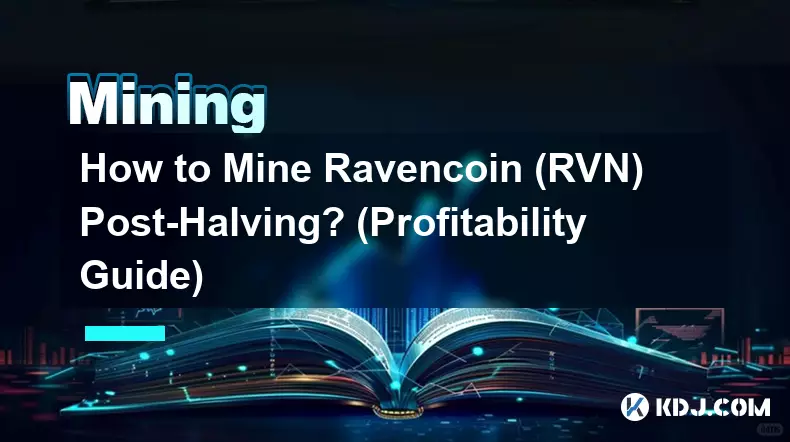
How to Mine Ravencoin (RVN) Post-Halving? (Profitability Guide)
Feb 01,2026 at 07:59am
Understanding Ravencoin Mining Mechanics1. Ravencoin operates on a proof-of-work consensus model using the KAWPOW algorithm, specifically designed to ...
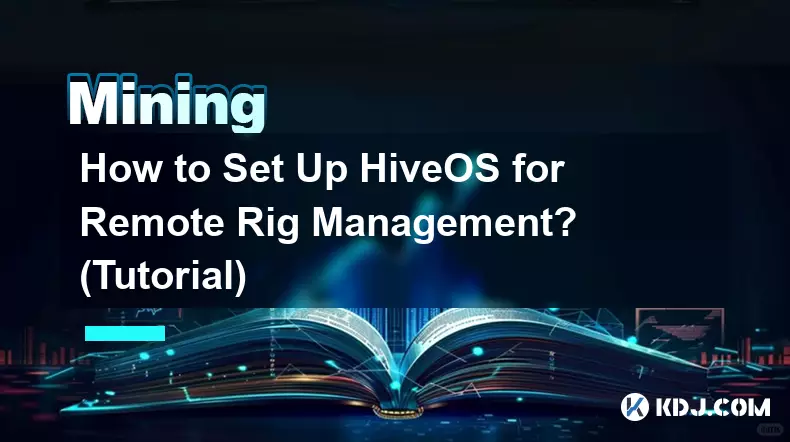
How to Set Up HiveOS for Remote Rig Management? (Tutorial)
Feb 01,2026 at 12:39am
Understanding HiveOS Fundamentals1. HiveOS is a Linux-based operating system specifically engineered for GPU mining rigs, offering lightweight perform...

How to Handle Mining Taxes in 2026? (Reporting Guide)
Feb 01,2026 at 01:39am
Tax Classification of Mining Rewards1. Cryptocurrency mining rewards are treated as ordinary income at the fair market value on the date of receipt. 2...

How to Start Solo Mining and Win a Block Reward? (High Risk/Reward)
Feb 01,2026 at 06:40am
Understanding Solo Mining Mechanics1. Solo mining means operating a full node and attempting to solve cryptographic puzzles independently without join...

How to Set Up Dual Mining for Higher Returns? (ETC + KAS)
Feb 01,2026 at 02:19am
Dual Mining Fundamentals1. Dual mining allows a single GPU to simultaneously contribute computational power to two different blockchains using compati...

How to Mine Alephium (ALPH) with High Efficiency? (Next-Gen Mining)
Feb 01,2026 at 05:39am
Understanding Alephium's Unique Consensus Mechanism1. Alephium employs a sharded Proof-of-Work (PoW) consensus called BlockDAG with Recursive Sharding...

How to Mine Ravencoin (RVN) Post-Halving? (Profitability Guide)
Feb 01,2026 at 07:59am
Understanding Ravencoin Mining Mechanics1. Ravencoin operates on a proof-of-work consensus model using the KAWPOW algorithm, specifically designed to ...

How to Set Up HiveOS for Remote Rig Management? (Tutorial)
Feb 01,2026 at 12:39am
Understanding HiveOS Fundamentals1. HiveOS is a Linux-based operating system specifically engineered for GPU mining rigs, offering lightweight perform...
See all articles





















![THIS IS THE HARDEST COIN TO GET [POLY DASH] THIS IS THE HARDEST COIN TO GET [POLY DASH]](/uploads/2026/01/31/cryptocurrencies-news/videos/origin_697e0319ee56d_image_500_375.webp)




















































